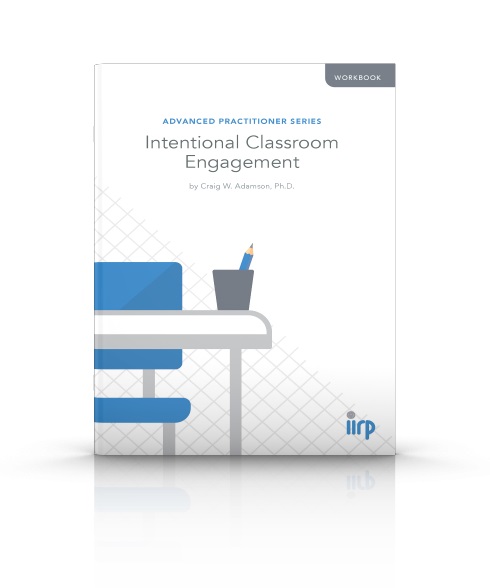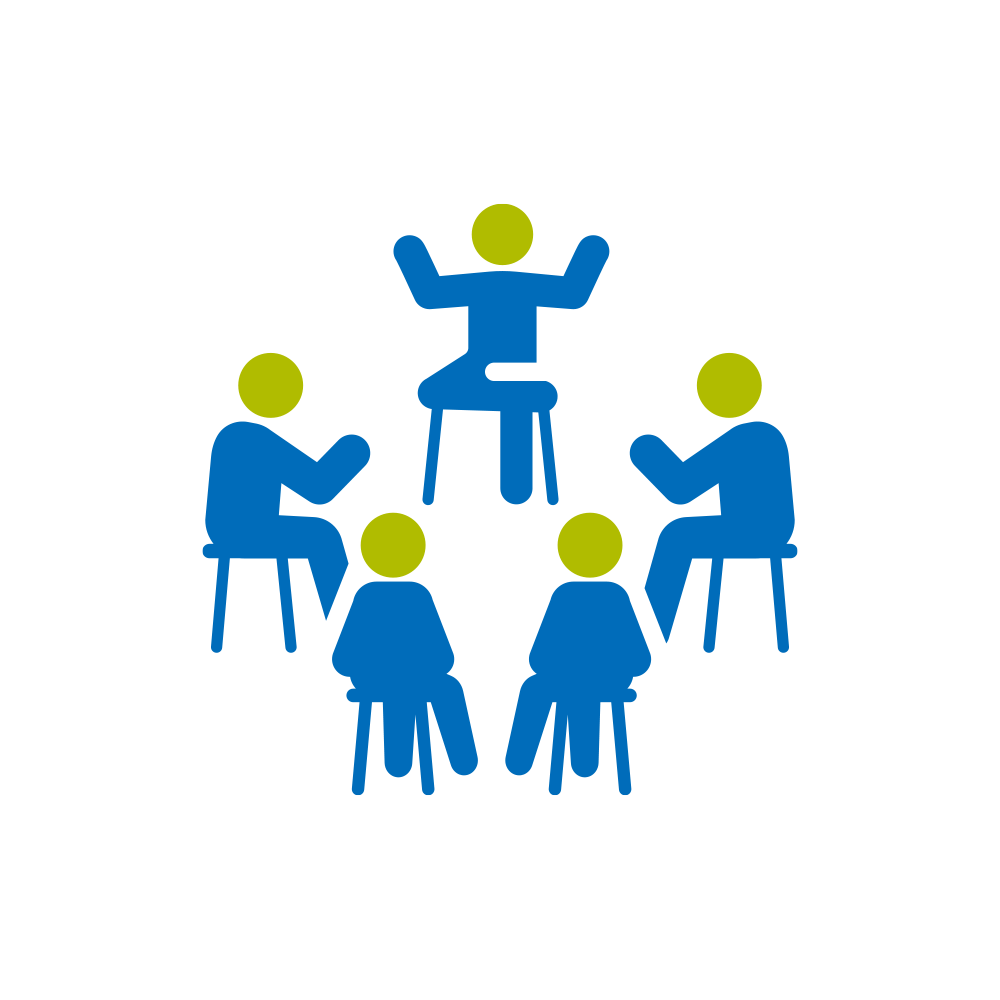Restorative Practices in Schools

Foster positive classroom and school culture
Building and strengthening relationships and community is a critical component of school culture. Restorative practices is an essential process for creating a positive learning environment, building social capital, and resolving relational issues.
During this two-day introductory experience, you will learn the fundamental theory and practices for engaging with students, staff, and parents in your school setting.
Topics include the importance of being explicit about practice, how to set high expectations while being supportive, and ways to build community in your setting. We will discuss giving direct feedback and asking questions that foster accountability, as well as utilizing effective methods to resolve common conflicts.
You will learn to apply the restorative practices continuum, understanding which restorative processes are best for achieving certain goals or responding to particular situations. We will focus specifically on facilitating circles, an essential process for creating a positive learning environment and school culture. Circles can be used both proactively and responsively to build social capital, sustain relationships, address social problems, and respond when harm occurs. Participants will spend time planning circles to use in their schools immediately.
Designed for:
K-12 teachers, staff, administrators. This experience is applicable to other audiences, but school-based examples are used.
Learning Format Options:
- Online: Two consecutive 4.5-hour days of live instruction via Zoom.
(2 hours of pre-work required prior to each session.) - In Person: Two consecutive 8-hour days of live instruction (two breaks and time for lunch included).
Note:
In conjunction with Restorative Justice Conferencing, this event can be applied to the blended RP 500 Basic Restorative Practices course at the IIRP Graduate School. Events are limited in capacity and fill up quickly. Please do not book any travel or accommodations for in-person experiences until the registration is confirmed.
Price: $475
Upcoming Events
Lean into Conflict to Build Effective, Resilient Workplaces
Creating vibrant, resilient workplaces with consistently high-performing teams can be challenging. How are such workplaces established? Through proactively approaching conflict and dealing with issues directly, effectively, and efficiently. Cultivating a work culture rooted in authentic conversation maintains high-performing teams, increases engagement, produces quality work, and increases workplace satisfaction that leads to higher retention.
This event equips individuals with the skills they need to welcome and address conflict, and to understand how conflict affects people intra-personally, interpersonally, and within their workplace environment. Guided by principles of restorative practices, participants gain actionable strategies to strengthen relational dynamics and promote a culture of shared accountability where better collaborative problem-solving and enhanced communication can thrive.
Participants can expect to:
- Develop skills to welcome and address conflict.
- Examine real-world scenarios and apply specific restorative practice principles to address identified challenges.
- Use inclusive decision-making models to explore applications of restorative practices principles to specific issues affecting their workplace.
- Craft a plan to navigate and address conflict in their workplace.
Designed for:
Administrators, managers, supervisors, directors, project managers, organizational development specialists, leaders, and those who work on teams across various sectors.
Learning Format Options:
- Online: Two consecutive 4.5-hour days of live instruction via Zoom.
- In Person: Two consecutive 8-hour days of live instruction (two breaks and time for lunch included).
Price: $475
Upcoming Events
Increase community connectedness, staff and family retention, and student success
When independent schools integrate restorative practices into their administrative and academic methods, they establish a culture of collaborative leadership that increases voice, agency, and belonging for all community members and provides students with transferrable leadership skills that are crucial to functioning in a diverse world.
During this two-day introductory experience, you will learn fundamental theory and practices for engaging with students, staff, and parents using restorative practices.
The learning experience focuses on creating systems that promote equity and inclusion for students and adults. General topics include:
- Striking a balance between setting high expectations and providing support
- Understanding the role of emotions as catalysts for words and actions
- Providing direct feedback and asking questions that foster accountability
- Using the most effective methods to resolve common conflicts
Participants learn strategies to:
- Proactively build relationships
- Create an authentic sense of community and belonging
- Practice participatory decision-making
- Speak from experience
- Listen to others
- Connect through our similarities
- Learn from our differences
- Work through conflict in a mutually respectful way
Participants also learn to facilitate circles, an essential process for creating a positive learning environment and school culture. Circles may be used to build social capital, resolve social tension, and respond when relational or community harm occurs.
Designed for: PK-12 teachers, staff, and administrators working in independent schools.
Learning Format
This experience is led by an experienced IIRP instructor who is familiar with the independent school world. This event is interactive. Individual participation throughout is highly encouraged and will greatly increase the benefits you receive.
- Online: Two consecutive 4.5-hour days of live instruction.
(2 hours of pre-work required prior to each session.) - In Person: Two consecutive 8-hour days of live instruction (two breaks and time for lunch included).
In conjunction with Restorative Justice Conferencing, this event can be applied to the blended RP 500 Basic Restorative Practices course at the IIRP Graduate School. Events are limited in capacity and fill up quickly. Please do not book any travel or accommodations for in-person experiences until the registration is confirmed.
Price: $505
Upcoming Events
Bring together those impacted to resolve conflict
Incidents of conflict, wrongdoing, and harm occur everywhere, every day in schools, workplaces, college campuses, neighborhoods, and families. The restorative justice conference provides a way to engage with those who cause and experience harm, along with the related community.
Restorative Justice Conferencing covers the fundamentals of facilitating a formal conference in response to an incident of wrongdoing or harm. You will then be able to utilize those skills to create deeper interpersonal understanding and repair relationships among those involved or affected by such an incident.
Designed for:
K-16 teachers, staff, and administrators, members of the criminal justice field, and other organizations. This experience is applicable to other audiences, but examples used come from school and criminal justice settings.
Learning Format Options:
- Online: Two consecutive 4.5-hour days of live instruction.
(2 hours of pre-work required prior to each session.)- Includes one role-play experience.
- Designed for those interested in developing their theoretical understanding of conferencing.
- In Person: Two consecutive 8-hour days of live instruction (two breaks and time for lunch included).
- Includes 5-6 role-playing experiences.
- Designed for those interested in developing their facilitation skills.
Note:
In conjunction with Restorative Practices for Educators, this event can be applied to the blended RP 500 Basic Restorative Practices course at the IIRP Graduate School. Events are limited in capacity and fill up quickly. Please do not book any travel or accommodations for in-person experiences until the registration is confirmed.
This event is the perfect primer for Putting Theory into Practice: Restorative Justice Conferencing Facilitation.
Price: $475
Upcoming Events
For Advanced Practitioners
 Students thrive in a school where they feel welcomed and accepted. This event is designed for restorative practitioners who have had previous training or classroom experience in restorative practices and will help you foster a spirit of shared ownership and responsibility within your classroom. The content of the workshop is based on the book Advanced Practitioner Series: Intentional Classroom Engagement by IIRP Senior Advisor to the President and Assistant Professor Craig W. Adamson.
Students thrive in a school where they feel welcomed and accepted. This event is designed for restorative practitioners who have had previous training or classroom experience in restorative practices and will help you foster a spirit of shared ownership and responsibility within your classroom. The content of the workshop is based on the book Advanced Practitioner Series: Intentional Classroom Engagement by IIRP Senior Advisor to the President and Assistant Professor Craig W. Adamson.

Advanced Training and Essential Skills for Facilitators
What is a listening circle?
Listening circles are a specific type of circle designed to help people process an event or issue that poses a challenge or harm to their communities or has impacted people in a significant way. They are voluntary, community-oriented forums aimed at providing an equitable opportunity for all attendees to have voice. Listening circles can be used in a variety of settings, including communities, workplaces, schools, organizations, neighborhoods, universities, and within families. They have roots in indigenous cultures and are backed by research in interdisciplinary studies.

The most valuable resource educators have is each other.
Are you invested in creating stronger relationships in your educational environment through the use of restorative practices?
This collaborative online professional learning community explores what works, what doesn’t, how and why.
Four live weekly Zoom sessions provide opportunities to practice the full range of restorative practices:
- Session 1 — Take inventory of successes and challenges and establish personal learning goals.
- Session 2 — Strategize what it means to set high expectations while also providing high levels of support in your setting.
- Session 3 — Delve deeply into proactive community building, including practical ways to foster positive relationships with students, staff and parents.
- Session 4 — Explore responses to harm and how to utilize restorative problem-solving strategies to address needs that arise among any group in the school community.
During each live session, participants may ask relevant questions, share their experiences, receive valuable feedback from their instructor and peers, and develop strategies for effective teaching and leadership.
This event is recommended for those wanting to gain the practical experience needed to Become a Restorative Practices Trainer.
Learning format
Designed for school and district leaders, teachers, counselors and paraprofessionals, each session is facilitated by one of our engaging instructors — experienced restorative practitioners who clearly articulate key concepts and field your questions. You will join them in a professional learning community with up to 20 passionate educators from schools around the country.
- You will participate in four 90-minute live Zoom sessions.
- Threaded discussions provide opportunities to reflect on your strengths and challenges, propose action steps and solicit feedback.
A basic familiarity with restorative practices is expected of participants.
Price: $595
Upcoming Events

Develop and advance circle facilitation skills and competencies through self-reflection and practice.
Sharpen your skills for the facilitation of all circles, including proactive community building circles and responsive circles that address tensions and conflict.
This collaborative online professional learning community explores what works, what doesn’t, how and why.
Four live weekly Zoom sessions provide opportunities to practice the full range of restorative practices:
- Session 1 — Examine the dynamic competencies of circle facilitators and self-reflect on current facilitation competencies.
- Session 2 — Effectively use circles to build and advance relationships, team, and communities, including using circles to manage conflict and tensions.
- Session 3 — Explore applications of circle approaches in various aspects of work, such as projects, programs, procedures, and curriculum.
- Session 4 — Determine how to be an effective circle facilitator when addressing serious situations.
During each live session, participants may ask relevant questions, share their experiences, receive valuable feedback from their instructor and peers, and develop strategies for effective circle facilitation skill development and experience.
Learning format
Designed for circle facilitators in any field or industry, each session is facilitated by one of our engaging instructors — experienced restorative practitioners who clearly articulate key concepts and field your questions. You will join them in a professional learning community with up to 20 passionate circle facilitators over four 2-hour live Zoom sessions.
A basic familiarity with restorative practices and facilitation of restorative circles is expected of participants.
Price: $595
Upcoming Events
Develop and advance your conference facilitation skills and competencies with this collaborative online professional learning community.
Incidents of conflict, wrongdoing, and harm occur everywhere, every day in schools, workplaces, college campuses, neighborhoods, and families. The restorative justice conference provides a way to engage with those who cause and experience harm, along with the affected community.
Through the professional learning community, participants will improve their facilitation competencies. They will utilize a process of self-reflection as they explore important considerations and context around the conflict being addressed. Participants will define what is needed to be successful in their specific setting as they contemplate the conference process as a responsive tool and its importance in building communities.
The professional learning community meets four times via video conferencing. The two-hour weekly sessions engage participants as they practice competencies supporting effective restorative justice conference facilitation:
- Session 1 – Create a deeper understanding of the restorative justice conferencing process. Review the conferencing script and explore the restorative principles and framework behind the conference process.
- Session 2 – Recognize important factors for effective conference facilitation and create steps to build facilitation skills.
- Session 3 - Identify important aspects of the conference preparation process and apply them to your specific setting.
- Session 4 - Analyze when you would and would not run a conference. Explore alternative approaches to resolving conflict.
Learning Format:
- You will participate in four, 2-hour live Zoom sessions.
- Learning materials and other resources prepare learners for the live sessions.
- Threaded discussions provide opportunities to ask relevant questions, share experiences, exchange resources, receive valuable feedback from the instructor and fellow peers, and develop strategies for effective conferencing and responsive work.
This professional learning experience is for participants who have experience in work that relates to the reparation of harm or have a strong familiarity with restorative conferencing concepts. Sessions are designed for individuals from any profession who commonly deal with conflict in their position. This may include those who work in criminal justice, education, community-based organizations, youth services, and facilitation and intervention in these spaces.
As a prerequisite, participants must have either completed the Restorative Justice Conferencing professional development training (online or in-person) or have read Restorative Justice Conferencing: Real Justice & The Conferencing Handbook.
Price: $595
Upcoming Events
The most valuable resource educators have is each other.
Are you invested in creating stronger relationships in your independent school environment through restorative practices? When independent schools integrate restorative practices into their administrative and academic methods, they establish a culture of collaborative leadership that increases voice, agency, and belonging for all community members and provides students with transferrable leadership skills that are crucial to functioning in a diverse world.
This collaborative online professional learning community explores what works, what doesn’t, how, and why.
All educators are welcome, but the discussions will revolve around the specific benefits and challenges of using restorative practices in an independent school setting.
Four live weekly Zoom sessions provide opportunities to practice the full range of restorative practices:
- Session 1 — Take inventory of current successes and challenges and establish personal learning goals.
- Session 2 — Strategize what it means to set high expectations while providing high levels of support in your specific setting.
- Session 3 — Delve deeply into proactive community building, including practical ways to foster positive relationships with students, staff, families, and board members.
- Session 4 — Explore responses to harm and how to utilize restorative problem-solving strategies to address needs that arise among any group in the school community.
Learning Format:
Designed for independent school administration, staff, teachers, counselors, and board members who aim to build stronger relationships and increase the sense of belonging in their school setting.
- You will participate in four, 90-minute live Zoom sessions.
- You are encouraged to connect with others in your sphere of influence to reflect on your strengths and challenges, propose action steps, and solicit feedback.
Language and methodologies presented in the introductory training Restorative Practices for Independent School Educators (RPIS) will make up the structural framework of discussions and activities in this experience. Previous participation in RPIS is not a prerequisite for this event.
A basic familiarity with restorative practices is expected of participants.
Upcoming Events
Bring awareness to individuals, enabling them to identify the discrepancy between their current behavior and their future goals.
Motivational Interviewing (MI) is a collaborative, research-based dialogue process that strengthens intrinsic motivation for change in individuals. Participants will learn how to positively influence individuals to make meaningful life changes. MI grew out of addiction treatment and has demonstrated effectiveness in the fields of criminal justice, education, organizational management, and healthcare.
MI is particularly effective with individuals who are non-compliant and resistant to making changes. Understanding the “Stages of Change” will help practitioners develop strategies to support individuals in identifying and achieving their goals or developing new ones.
Designed for:
Counselors, K-12 teachers, staff, and administrators, members of the criminal justice, healthcare, higher education, and organizational management fields, and coaches.
Learning Format:
In Person: One 6.5-hour day of live instruction
Price: $395
Upcoming Events
Cultivate change and improve well-being across your higher education setting.
We recognize that every campus is unique. In-person, off-campus and virtual academic life is vast and diverse. Encouraging deeper relationships between individuals and promoting social connections within the campus community strengthens equity, belonging, and collective efficacy. This leads to happier, healthier, and more productive campus communities.
In this professional development event, you will learn ways to foster and facilitate engagement and build positive relationships, whatever your sphere of influence on campus. This event is applicable to all members of the higher education community, including academic affairs, student life, faculty, staff, and students.
Learning Outcomes
- Describe restorative practices concepts and principles.
- Describe how restorative practices can improve leadership and interpersonal influence.
- Reflect on your relational culture, professional practice and interpersonal influence.
- Identify areas for improvement in professional practice and interpersonal influence.
- Demonstrate the restorative practices continuum.
Learning Format
- Online: Two consecutive 4.5-hour days of live instruction via Zoom
- In Person: Two consecutive 8-hour days of live instruction (two breaks and time for lunch included).
Price: $505
Upcoming Events
Empower youth to take responsibility for their behavior and learn healthier ways to interact
Explore how to reduce violence and youth aggression, whether you work in education, criminal justice, social services, or youth counseling. Aggression Replacement Training® is an intervention for aggressive adolescents and children consistent with the restorative practices framework.
Several studies have demonstrated its efficacy in reducing aggressive behavior and improving anger control, social skills, and moral reasoning in at-risk children and youth. This workshop will present the rationale and background underlying this group process and its specific procedures, materials, and application. It will also explore the causes of aggression, its magnitude and impact, and “best practice” solutions. Facilitators will review generalization techniques to increase the likelihood that prosocial skills learned here will transfer to other settings and endure over time.
Note: This event is the first step in learning about Aggression Replacement Training®. Implementing Aggression Replacement Training® as a 10-week program requires a co-facilitated process with at least two trained staff and guidance from master trainers. The 10-week program is an evidence-based prevention and intervention support for adolescents.
Through interactive exercises, demonstration, guided practice, and implementation planning, you will learn the three components of Aggression Replacement Training®:
- SkillStreaming, which teaches a curriculum of prosocial, interpersonal skills.
- Anger Control Training, which teaches youth how to identify triggers and manage one’s responses.
- Moral Reasoning Training, which promotes values that respect the rights of others and helps youths engage in conversation based on values and decision-making in problem situations.
In addition to the training manual, you will receive two books:
- Skillstreaming the Adolescent: A Guide for Teaching Prosocial Skills by Ellen McGinnis, with Robert P. Sprafkin, N. Jane Gershaw, and Paul Klein
- Anger Control Training: Prepare Curriculum Implementation Guide by Mark Amendola and Robert Oliver
Designed for:
Counselors, K-12 teachers, staff, and administrators, social services providers, and members of the criminal justice field
Learning Format:
- In Person: Two consecutive 8-hour days of live instruction (two breaks and time for lunch included).
Price: $425
Upcoming Aggression Replacement Training® events
No in-person events are scheduled at this time. Please see our Online Events, and check back for future in-person offerings.
